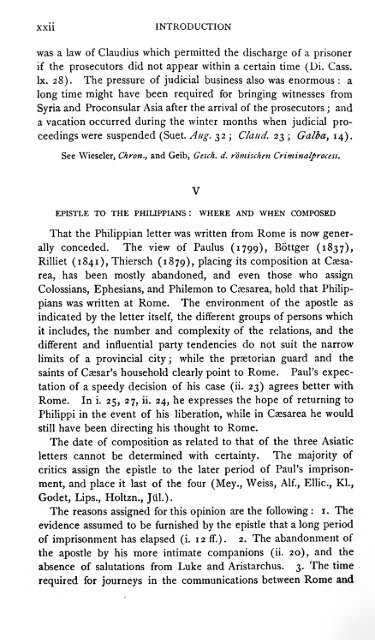Philippians and Philemon - MR Vincent - 1906.pdf
Philippians and Philemon - MR Vincent - 1906.pdf
Philippians and Philemon - MR Vincent - 1906.pdf
You also want an ePaper? Increase the reach of your titles
YUMPU automatically turns print PDFs into web optimized ePapers that Google loves.
xxii<br />
INTRODUCTION<br />
was a law of Claudius which permitted the discharge of a prisoner<br />
if the prosecutors did not appear within a certain time (Di. Cass.<br />
Ix. 28). The pressure of judicial business also was enormous : a<br />
long time might have been required for bringing witnesses from<br />
Syria <strong>and</strong> Proconsular Asia after the arrival of the prosecutors ;<br />
<strong>and</strong><br />
a vacation occurred during the winter months when judicial pro-<br />
ceedings were suspended (Suet. Aug. 32 ; Claud. 23 ; Galba, 14).<br />
See Wieseler, Ckron., <strong>and</strong> Geib, Gesch. d. rdmischen Criminalprocess.<br />
EPISTLE TO THE PHILIPPIANS : WHERE AND WHEN COMPOSED<br />
That the Philippian letter was written from Rome is now gener-<br />
ally conceded. The view of Paulus (1799), Bottger (1837),<br />
Rilliet (1841), Thiersch (1879), placing its composition at Caesa-<br />
rea, has been mostly ab<strong>and</strong>oned, <strong>and</strong> even those who assign<br />
Colossians, Ephesians, <strong>and</strong> <strong>Philemon</strong> to Caesarea, hold that Philip-<br />
pians was written at Rome. The environment of the apostle as<br />
indicated by the letter itself, the different groups of persons which<br />
it includes, the number <strong>and</strong> complexity of the relations, <strong>and</strong> the<br />
different <strong>and</strong> influential party tendencies do not suit the narrow<br />
limits of a provincial city; while the praetorian guard <strong>and</strong> the<br />
saints of Caesar's household clearly point to Rome. Paul's expec-<br />
tation of a speedy decision of his case (ii. 23) agrees better with<br />
Rome. In i. 25, 27, ii. 24, he expresses the hope of returning to<br />
Philippi in the event of his liberation, while in Caesarea he would<br />
still have been directing his thought to Rome.<br />
The date of composition as related to that of the three Asiatic<br />
letters cannot be determined with certainty. The majority of<br />
critics assign the epistle to the later period of Paul's imprison-<br />
ment, <strong>and</strong> place it last of the four (Mey., Weiss, Alf., EUic, Kl.,<br />
Godet, Lips., Holtzn., Jul.).<br />
The reasons assigned for this opinion are the following : i. The<br />
evidence assumed to be furnished by the epistle that a long period<br />
of imprisonment has elapsed (i. 12 ff.). 2. The ab<strong>and</strong>onment of<br />
the apostle by his more intimate companions (ii. 20), <strong>and</strong> the<br />
absence of salutations from Luke <strong>and</strong> Aristarchus. 3. The time<br />
required for journeys in the communications between Rome <strong>and</strong>





